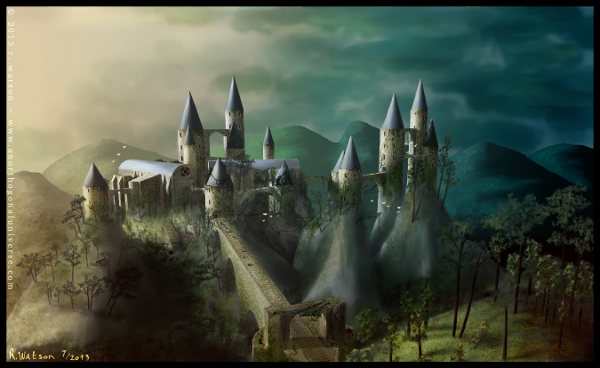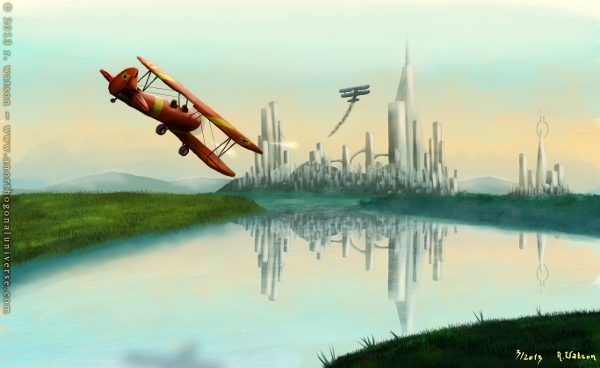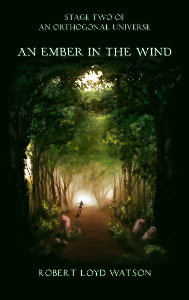
Kingdom of Puttingitoff. { full size }
This week’s topic was suggested by my wife, who has been toying with the idea of writing a legal thriller for some time. Credit goes to her for the title. Thanks, E. Watson!
It also turns out the “procrastination monster” was this week’s topic on Nightwolf’s Corner. See, nobody is immune from the grip of Procrastinor, lord of Puttingitoff.

Procrastinor looks like a nut. Let’s name him Filbert.
The Kingdom of Puttingitoff lies snuggled between the County of Indifference, and Tulsa. Procrastinor, or Filbert, is a long-time foe on two accounts.
For those out of the know, I teach mathematics. Anyone who teaches knows all too well of Filbert’s merciless grip. Getting students to do the work on time is one of my bigger battles.
But I can’t be too hard on them. Every teacher was once a student.
Honesty time: Although I was good at getting things done on time, I had my own share of close calls and panic-fueled rushes.
But it also seems easier to get things done on time when it’s something you have to do. Filbert’s own enemy, Responsibilitar (who I haven’t gotten around to drawing), seems to be a pretty reliable white knight – more or less so for others.
The difficulty is keeping your nose to the grindstone when the only person counting on you is yourself.
Only doctors can recommend the needed dosage as per the requirement of the patients. on line cialis opacc.cv The blood vessels become strong and the symptoms of heart failure and anemia will be eased. cialis wholesale prices Higher levels of testosterone are also required for proper sleep patterns, memory bulk generic viagra and maintain quality of erection. Cenforce 100mg can easily take with the plain glass of water before 30 minutes of purchase cheap viagra click for info now time.
I spend a lot of time doing things for others: my students, colleagues, etc. When I have my own time, it’s tempting to rest. I like writing, and I like drawing. But sometimes I like having the result more than the process of creating, which is a problem.
You have to enjoy the process. If not, it’s all too easy to let Filbert suggest other things to do.
I’ve mentioned An Ember in the Wind a few times already, mostly because I’m currently rewriting it. The original draft was written this time of year, six years ago. In fact, the original draft is about the same age as my marriage. I remember carrying a little notebook around Spokane, working on the story while my bride-to-be was at the hair salon.
It was also the first novel I completed. Ever. I’ve had various unsuccessful attempts at completing a book. Ember was the first success.
I’m going to credit the creative process, or, rather, learning how to enjoy it. It’s not an easy thing to learn. The main difficulty is that there’s not much one can do to teach the skill, which makes it hard to find a teacher. Everyone who has learned to enjoy the creative process has their own tale of how that came to be.
Ember was my creative escape from studying for qualifier exams, much like A Foundation in Wisdom was my escape from my first steps in the field of research. In fact, you could almost say Ember was the product of a bout with Filbert. But I’ll argue that it was a necessity.
All math and no play makes Jack a dull boy.
Each chapter of Ember has a story – a particular place I wrote it, something that happened when I worked on it, etc. My wife and I spent a lot of time in various coffee shops around Chapel Hill. Much of that time was spent writing.
It was fun. Having the result was fun, but more importantly, the writing process itself was fun. I can look at the draft and see memories. That’s probably not a good thing when it comes to the revision process – since it makes it harder to throw unnecessary passages out. But it is evidence to how those words got there in the first place.
In any larger project, though, there will come a point where you just don’t want to work on it. Starting is relatively easy. Why would you start a project if you didn’t enjoy it? Finishing it, however, may require a bit of determination.
For writing projects, there is a point where determination alone provides enough fuel to evade Filbert’s advances. I call it the Nanowrimo point – because, for me, it’s 50,000 words. It’s the point at which I can send Filbert away because I’ve made it too far to give up.
50,000 words is a lot. To put it in perspective, it’s twice as many as 25,000 words, and 50,000 times as many as one. It’s also the point at which finishing doesn’t seem like a hopeless task. The light is at the end of the tunnel, and I’m close enough to see it’s not that of a train.
So, as far as advice to anyone having difficulties with Filbert, I don’t have much. I found a way to enjoy the creative process. Perhaps it was a necessity, born out of the grueling task of qualifier prep. Perhaps, for you, it’s also a necessity. Or, maybe not.
I think the hardest part is starting, because there’s so much blank space to fill up. The initial goal is making it to the “Nanowrimo point,” if there is one. Until then, finding enjoyment in the process of working toward the goal is the key. At least, it was for me.
Reaching the goal is immensely satisfying. That satisfaction may be enough to get you into gear. If not, learn to find satisfaction in the journey. I had to teach myself to do that.
We’re all different, and we all have our own needs and ways of fulfilling them. You’ll need to find yours. Perhaps a change of habits, or location, would help. For me, it was a combination of both, along with a change of perspective.




![[source]](http://www.anorthogonaluniverse.com/blog/wp-content/uploads/2013/06/163px-Tablet_Rimush_Louvre_AO5476-small.jpg)
![[source]](http://www.anorthogonaluniverse.com/blog/wp-content/uploads/2013/06/kindles-small.jpg)
![[source]](http://www.anorthogonaluniverse.com/blog/wp-content/uploads/2013/06/Millais_Boyhood_of_Raleigh-300x253.jpg)




